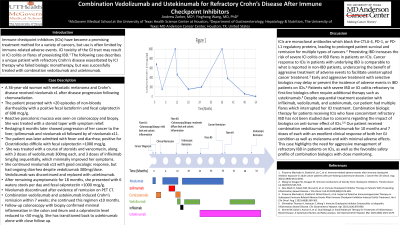Monday Poster Session
Category: IBD
P2692 - Combination Vedolizumab and Ustekinumab for Refractory Crohn’s Disease After Immune Checkpoint Inhibitors
Monday, October 28, 2024
10:30 AM - 4:00 PM ET
Location: Exhibit Hall E

Has Audio

Andrew W. Zarker, MD
McGovern Medical School at UTHealth
Baltimore, MD
Presenting Author(s)
Andrew W. Zarker, MD1, Yinghong Wang, MD, PhD2
1McGovern Medical School at UTHealth, Baltimore, MD; 2University of Texas MD Anderson Cancer Center, Houston, TX
Introduction: Immune checkpoint inhibitors (ICIs) have become a promising treatment method for several cancers, but their use is limited by immune-related adverse events. Patients with preexisting inflammatory bowel disease (IBD) are at greater risk for developing ICI toxicities, necessitating treatment with steroids and biologics. This case describes a unique patient with refractory Crohn’s disease exacerbated by ICI therapy who failed biologic monotherapy, but was successfully treated with combination vedolizumab and ustekinumab.
Case Description/Methods: A 36-year-old woman with metastatic melanoma and Crohn’s disease started ICIs after cancer progression following radiation therapy and chemotherapy. After one cycle of nivolumab, the patient presented with >20 episodes of diarrhea per day with a fecal calprotectin of 698 mcg/g. There was evidence of mild ileitis and colitis on colonoscopy/biopsy, so she was treated with a steroid taper with symptom relief. Over the next 24 months, the patient continued ICIs and had two more Crohn’s flares. She was treated with vedolizumab, infliximab, and ustekinumab sequentially with eventual failure. ICIs were discontinued after imaging indicated cancer remission. 1 month later, she presented with diarrhea and had a calprotectin of >1000 mcg/g. Combination vedolizumab and ustekinumab was initiated, which induced clinical remission within 7 weeks. She remained off ICIs and continued on combination biologics for a total of 10 months, which led to endoscopic remission and a calprotectin level of < 50 mcg/g. She has remained in remission with ustekinumab monotherapy.
Discussion: Infliximab and vedolizumab are used to treat patients on ICIs with moderate to severe IBD with good efficacy. Patients with IBD refractory to first-line biologics often require additional therapy such as ustekinumab. Despite treatment escalation with infliximab, vedolizumab, and ustekinumab, our patient had multiple Crohn's flares which interrupted her ICI treatment. Combination biologic therapy for patients receiving ICIs who have refractory IBD has not been studied due to concerns regarding potent immunosuppression on anti-tumor effect of ICIs. Our patient received combination biologics for 10 months and 7 doses of each with excellent clinical response of both her Crohn's and melanoma with minimal adverse effects. Our case highlights the need for aggressive management of refractory IBD in patients on ICIs, as well as the favorable safety profile of combination biologics with close monitoring.

Disclosures:
Andrew W. Zarker, MD1, Yinghong Wang, MD, PhD2. P2692 - Combination Vedolizumab and Ustekinumab for Refractory Crohn’s Disease After Immune Checkpoint Inhibitors, ACG 2024 Annual Scientific Meeting Abstracts. Philadelphia, PA: American College of Gastroenterology.
1McGovern Medical School at UTHealth, Baltimore, MD; 2University of Texas MD Anderson Cancer Center, Houston, TX
Introduction: Immune checkpoint inhibitors (ICIs) have become a promising treatment method for several cancers, but their use is limited by immune-related adverse events. Patients with preexisting inflammatory bowel disease (IBD) are at greater risk for developing ICI toxicities, necessitating treatment with steroids and biologics. This case describes a unique patient with refractory Crohn’s disease exacerbated by ICI therapy who failed biologic monotherapy, but was successfully treated with combination vedolizumab and ustekinumab.
Case Description/Methods: A 36-year-old woman with metastatic melanoma and Crohn’s disease started ICIs after cancer progression following radiation therapy and chemotherapy. After one cycle of nivolumab, the patient presented with >20 episodes of diarrhea per day with a fecal calprotectin of 698 mcg/g. There was evidence of mild ileitis and colitis on colonoscopy/biopsy, so she was treated with a steroid taper with symptom relief. Over the next 24 months, the patient continued ICIs and had two more Crohn’s flares. She was treated with vedolizumab, infliximab, and ustekinumab sequentially with eventual failure. ICIs were discontinued after imaging indicated cancer remission. 1 month later, she presented with diarrhea and had a calprotectin of >1000 mcg/g. Combination vedolizumab and ustekinumab was initiated, which induced clinical remission within 7 weeks. She remained off ICIs and continued on combination biologics for a total of 10 months, which led to endoscopic remission and a calprotectin level of < 50 mcg/g. She has remained in remission with ustekinumab monotherapy.
Discussion: Infliximab and vedolizumab are used to treat patients on ICIs with moderate to severe IBD with good efficacy. Patients with IBD refractory to first-line biologics often require additional therapy such as ustekinumab. Despite treatment escalation with infliximab, vedolizumab, and ustekinumab, our patient had multiple Crohn's flares which interrupted her ICI treatment. Combination biologic therapy for patients receiving ICIs who have refractory IBD has not been studied due to concerns regarding potent immunosuppression on anti-tumor effect of ICIs. Our patient received combination biologics for 10 months and 7 doses of each with excellent clinical response of both her Crohn's and melanoma with minimal adverse effects. Our case highlights the need for aggressive management of refractory IBD in patients on ICIs, as well as the favorable safety profile of combination biologics with close monitoring.

Figure: Figure 1: (A) Calprotectin Trend, (B) Clinical Course and Medication Timeline
Disclosures:
Andrew Zarker indicated no relevant financial relationships.
Yinghong Wang: AzurRx – Consultant. Ilyapharma – Consultant. IOTA – Consultant. Sorriso – Consultant. Tillotts – Consultant.
Andrew W. Zarker, MD1, Yinghong Wang, MD, PhD2. P2692 - Combination Vedolizumab and Ustekinumab for Refractory Crohn’s Disease After Immune Checkpoint Inhibitors, ACG 2024 Annual Scientific Meeting Abstracts. Philadelphia, PA: American College of Gastroenterology.
